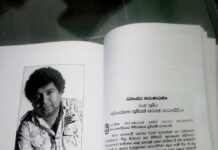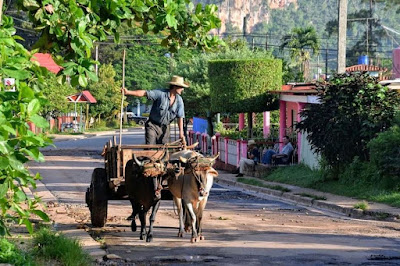ළඟකදී මා සමග එකට සෝවියට් දේශයේ උගත් කියුබානු මිතුරන් හතර දෙනෙකු නැවත සොයා ගැනීමට හැකි වුනි. ඒ සඳහා උපකාර කලේ රතනපාල නමැති මහතෙකි. ඔහු කියුබාවේ ශ්රී ලංකා තානාපති කාර්යාලයේ සේවය කළ අයෙකි.
මා සමග උගත් කියුබන් යහළුවන් ගැන වසර පහකට පමණ ඉහතදී මගේ බ්ලොගයේ ලියා තිබුනු බව සමහර පාඨකයන්ට මතකයේ තිබෙන්නට පුළුවන. මේ ඒ ලිපි වලින් දෙකකි..
මේ ලිපි මාලාවේ දෙවන ලිපියේ සඳහන් එචේවාරියා අරියෙල්, කස්තියෝ, ඔස්වල්ඩෝ ඔලිවා ආදීන් නැවත හමුවීමත් සමග ඔවුන්ගෙන් ලත් තොරුතුරු මත, කියුබාව පත්වූ තත්වය ගැන ලිවිම මේ ලිපියේ අරමුණයි. මම සැමවිටම ලැබෙන තොරතුරු සොයා බලන අතර මගේ අදහස්ද යාවත්කාලීන කර ගන්නා අයෙක්මි. මගේ පරණ ලිපි හා නව ලිපි කියවන විට ඒ බව වැටහෙනු ඇති.
කියුබාව ගැන මගේ සිතේ කොහොමත් තිබුනේ මෘදු අදහසකි. එක හේතුවක් නම් අපේ තරුණ වියේදී අප විසින් රොමැන්තිකරණය කරගත් කියුබානු විප්ලවයයි. දෙවන හේතුව වූයේ එය මෙහෙයවූ චාම්, එහෙත් වීරත්වය මුසු නායකයන් දෙපල වූ චේ ගෙවාරා හා පිදෙල් කස්ත්රෝය. අපේ පාරිශුද්ධ වූ පරමාදර්ශී සිහින ලෝකයේ කියුබාව සමාජවාදී පාරාදීසයක් නම් සෝවියට් දේශය සමාජවාදී දෙව්ලොව විය.
මගේ මහත් පුදුමයට හේතුවක් වූයේ කියුබාව සමාජවාදී රටකට තිබෙන හොඳම මොඩලය ලෙස බ්රිතාන්ය කම්කරු පක්ෂයේ ඇතැම් සාමාජිකයන් සළකන බව දැන ගැනීමයි. වසර කිහිපයකට පෙරාතුව, කෝබින් ගේ අවධියේ දී සමහරු කියුබාවට ගොස් ජීවත් වීමට පවා කැමැත්තෙන් සිටියහ. නමුත් ඒ දිනවලදීම මගේ සිතට නැගුනු සිතිවිල්ලක් නම් සම්පූර්ණ බටහිර මාධ්ය ජාලා සමූහයම කියුබාවේ නොයෙකුත් හිඟකම් , පසුගාමී භාවයන් පෙන්වද්දීම ඔවුන් එසේ සිතන්නේ ඇයිද යන්නය. බටහිරදී ඔබට ඔබේ දේශපාලකයා තෝරා ගැනීමට ඡන්දය දිය හැකි අතර ජීවිතය කියුබාවේ තරමටම අපහසු නොවන සුඛෝපභෝගී එකකි. (සැමටම සුඛෝපභෝගී නොවන බවද සැබෑවැකි). මේ ටෝරි පාලනය හැර එක්සත් රාජධානියේ ඇති ප්රශ්නය කුමක්ද? එය ධනවාදී රටක් බව සැබෑය . එහෙත් ඔබට නොමිලේ ප්රතිකාර ගැනීමට නිදහස් සෞඛ්ය සේවයක් තිබේ. ඔබ රැකියා විරහිතයෙක් නම් රජය ඔබට සහනාධාර මුදලක් ලබා දෙයි. ඔබේ නිවසේ කුලිය ගෙවයි. දරුවන්ට ආහාර කූපන් පත් ලබා දෙයි. ඇඳුම් කූපන් ලබා දෙයි. නොමිලේ දන්ත වෛද්ය පහසුකම් ලබා දෙයි. නොමිලේ ඇස් කණ්නාඩි සහ බෙහෙත් ලබා දෙයි. ලබා දෙන තට්ටු ගෙවල් අති සුඛෝපභෝගී ඒවා නොවුවත් කියුබාව හෝ ලංකාව වැනි රටවල ඇති සමහර නිවාස වලට වඩා ඒවා හොඳය. (මේ ලංකාවේ පොහොසත් මධ්යම පන්තිකයන් ගැන කියන්නක් නොවන නිසා කලබල නොවන්න)
මා කිසි දිනක කියුබාවට නොගියද සමාජවාදී සෝවියට් දේශයේ උගත්තෙක්මි. මා ඉතා ඉක්මනින් වටහා ගත් දෙය නම් සෝවියට් දේශය එහි වැසියන්ට සමාජවාදී දෙව්ලොවක් නොවන බවයි. ඒ එසේ වුවද සෝවියට් දේශය සමග ඉමහත් සොඳුරු බැඳියාවක් අපට තිබුණි. සමහර විට ඒ පියකරු රුසියානු කෙල්ලන් නිසාද නැතහොත් ආසියානු රටකදී, නිවසකදී නොලැබෙන තරමේ නිදහසක් යුරෝපීය රටක විඳින නිසාද යන්න නොදනිමි. නමුත් සෝවියට් දේශය එදවස අසූව දශකයේ ශ්රී ලංකාවට වඩා නම් දියුණු රටක් විය. ඔවුන් අපට ඉතා සංග්රහ ශීලි වූ අතර නොමිලේ විශ්ව විද්යාල අධ්යාපනයද ලබා දුනි. එය එක්තරා ආකාරයකට විශේෂිත වූ රටක් විය. දූපත් රටක් වූ ශ්රී ලංකාවෙන් පැමිණි මට ලෝකයට අභිමුඛ වීමට දෑස් විවර කර දුන්නේ සෝවියට් දේශයයි.
එක්සත් රාජධානියේ ජීවිතය අපට දියුණු වීමට හා මුදල් උපයා ගැනීමට අවස්ථාවක් ලබා දුනි. සෝවියට් දේශයේ උගත් අනිකුත් බොහෝ විදේශීය උපාධිධරයන්ද ඇමෙරිකා එක්සත් ජනපදය, ඔස්ට්රේලියාව, කැනඩාව, නවසීලන්තය හා යුරෝපීය රටවල් වලට සංක්රමණයව පදිංචි වුනි. ඔවුන්ගේ ජිවන තත්වයන්ද වඩා යහපත් ඒවා බව සැඟවිය නොහැකිය. එසේම ඉන් බොහෝ දෙනා වැඩිදුර ඉගෙන අධ්යාපනඥයන්, විද්යාඥයන් සහ තම ක්ෂේත්ර වල ප්රවීණයන් බවටද පත්වූහ. බටහිර රටවලින් ජිවිත දියුණුවට ලැබුණු අවස්ථාවන් ගෙන් උපරිම ප්රයෝජනයක් ගැනීමට ඔවුහු දක්ෂයන් වූහ. එහෙත් සමාජවාදී සෝවියට් සමූහාණ්ඩුවේ ගතකල ජීවිතය පිළිබඳ නොස්ටල්ජියාව සහ බැඳීම ඔවුනතර තවමත් නොවෙනස්ව පවතී.
මගේ කියුබානු මිතුරන් කොහේ වෙසෙනු ඇත්ද යන්න ගැන මම නිතරම සිතුවෙමි. විශ්ව විද්යාල සාමය තුලදී ඔවුහු මට නිතරම පාපන්දු ක්රීඩා කිරීමට යාමට ආරාධනය කළහ. රුසියාවේ දරුණු ශීත සමය තුල පවා අපි පාපන්දු ක්රීඩා කළෙමු. ෆේස්බුක් හරහා නැවත හඳුනා ගන්නට ලැබුනේ මට ඉන් හතර දෙනෙකි . ෆේස්බුක් ගිණුම තවමත් රැගෙන යන්නට එයත් හොඳ හේතුවකි. බොහෝ මිතුරන් වඩා හොඳ ජිවන තත්වයන් උදෙසා කියුබාවෙන් ඉවතට පියාඹා ගොස් තිබුණි. මම ඔවුන්ගේ වරදක් නොදකිමි. අප කළේද එයමය. මා හඳුනා ගත්තේ එචේවරියා අරියෙල්, රූබෙන්, ඔස්වල්දෝ ඔලිවා සහ උදෙය් රමිරස් මෝසා ය. උදේයි සහ අරියෙල් තවමත් සතුටින් ජීවත් වන්නේ කියුබාවේය. උදෙයි තමන්ගේ විවාහක පවුල මෙන්ම මව, සහෝදරිය හා නෑදෑයන් සමග ජිවත් වෙයි. ඔස්වල්දෝ රැකියාව කරන්නේ ටෙනරිෆ් වලය. රූබෙන් රැකියාව කරන්නේ ආර්ජන්ටිනාවේය. අරියෙල් කියුබාවේ රාජ්ය විදුලි බල සමාගමක අධ්යක්ෂකවරයෙකි.
අරියෙල් පැවසුවේ සෝවියට් දේශය බිඳ වැටුණු පසු කියුබාවේ ජීවිතය ඉතා දුෂ්කර එකක් වූ බවයි. එය කියුබානු සමාජවාදී ආණ්ඩුවටඉතා අපහසු වූ කාලයක් බව මම දැන සිටියෙමි. සෝවියට් දේශය කියුබාවේ සීනි සහ අනිකුත් නිෂ්පාදන වල ප්රධාන ගැනුම්කරුවා වූවා පමණක් නොව යුධ ආධාර සපයන්නා ද, අඩු මිලට ඛනිජ තෙල් සැපයුම් කරුවාද විය. එසේම සමාජවාදී රටවල් සමූහය සමගම කියුබාව හොඳ ආර්ථික සම්බන්ධතාවයක්ද වෙළඳාමක්ද පවත්වා ගෙන ගියේය. සමාජවාදී රටවල බිඳ වැටීමත් සමග මේ සියල්ල නතර විය. කියුබාවට එදිරිව එක්දාස් නමසිය හැට ගණන් වල සිට පවත්වාගෙන එන ඇමෙරිකානු සම්බාධක නිසා තත්වය තව තවත් දරුණු විය.
කියුබාව පිළිබඳව එකිනෙකට ප්රතිවිරෝධී මතයන් දෙකක් සැමදාමත් පැවතුනි. සමාජවාදීන් පවසන්නේ කියුබාව සීග්රයෙන් දියුණු වන, තෙවැනි ලෝකයේ නොවන රටක් බව හා, ඇමරිකානු සම්බාධක නොමැති වූවා නම් වඩාත් දියුණු රටක් විය හැකිව තිබෙන බවයි. ප්රතිවිරුද්ධ මතවාදීන් පවසන්නේ එය තෙවන ලෝකයේ, සාමාන්යයෙන් “බනානා රිපබ්ලික්” ලෙස උපහාසයෙන් හඳුන්වන, මානව හිමිකම් නොමැති අපායක් බවයි. අප දැන් දන්නේ කියුබාව විදේශ සංචාරකයන්ට රට විවෘත කිරීමත් සමග සෑහෙන දියුණුවක් ලබා ඇති බවයි. එසේනම් මේ දෙපසටම පක්ෂාපාතී නොවන මතයක් අපට සොයා ගත හැකිද?
පසුගිය දිනෙකදී මම විශිෂ්ඨ යයි කිවහැකි වාර්තා චිත්රපටයක් නැරඹුවෙමි. මා අසා ඇති පරිදි ෆිදෙල් කස්ත්රෝ කිසි දිනෙක ඇමෙරිකානු ජනතාවට දොස්නගා, විවේචන කර නොමැත. ඔහුගේ දරුණු විවේචන නිතර එල්ල වූයේ ඇමෙරිකානු විදෙස් පිළිවෙතට හා ඇමෙරිකානු රජයටය. ඔහු කිසිදු දිනෙක ඇමෙරිකාව විසින් අත්කරගත් විද්යාත්මක ක්ෂේත්රයන් හි ජයග්රහණ මෙන්ම සංගීතය හා වෙනත් ක්ෂේත්රයන් හි ජයග්රහනද හෙලා නොදුටු බව මෙම වාර්තා චිත්රපටය ඔප්පු කර පෙන්වයි. නමුත් එක්සත් ජාතින් ගේ සංවිධානය ඇමතීමට පළමුවරට එක්සත් ජනපදයට ගොඩ බට වෙලේ ඇමෙරිකානු ආගමන විගමන නිලධරයන් ජනාධිපතිවරයෙකුට සුදුසු ලෙසට කස්ත්රෝට සැලකුවේ නැත. ඔහු එයද සිනාමුසු මුහුණින් භාර ගත්තේය. ඔහුගේ එදා රැස්ව සිටි ලෝක නායකයන් ගෙන් විනාඩි ගණනක අත්පොළසන් නාදයක් ලැබුණි.
චිත්රපටයේ තිර රචනය ලියා, නිෂ්පාදනය සහ අධ්යක්ෂණය ද කරන ලද්දේ ජෝන් ඇල්පට් විසිනි. ඔහු කියුබාවට යාම් ඊම් පටන් ගත්තේ හැත්තෑ දශකයේ මුල සිටය. කියුබානු ඉතිහාසය හා දේශපාලනය හැදෑරීම ඔහුගේ එක අභිලාශයක් විය. භාණ්ඩ හිඟකම් පැවතුනත් කියුබාව තම හොඳම කාලය ගත කලේ හැත්තෑව, අසූව දශකයන්හිදීය. මිනිසුන් ගේ සාපේක්ෂව කරදරයකින් තොර, සෞඛ්ය ආරක්ෂාව ඇති ජීවිත ගත කළහ. මේ කියන්නේ දියුණු බටහිර රටකට සාපේක්ෂව නොවේ. තෙවැනි ලෝකයේ රටකට සාපේක්ෂවය. නමුත් 1992 වනවිට සම්පුර්ණ වූ සෝවියට් දේශය ප්රමුඛ සමාජවාදී කඳවුරේ නාය යාමත් සමග කියුබානු ආර්ථිකයේ බිඳ වැටීම ඇරඹුණි. ඒ වනතුරුම අතිශයින්ම සෘජු රාජ්ය මැදිහත්වීමක් සහිත ආර්ථිකයට ගසා තිබූ සෝවියට් මුක්කු ශක්තිමත්ව තිබුණි.
ජෝන් ඇල්පට් මේ අතිශය සංවේදී කාලය වාර්තාගත කරන්නේ ඉතා සංයමයෙනි. ඔහු නිතර හමුවී රූපගත කළ පවුලක ගොවින් තිදෙනෙක් සහ ඔවුන්ගේ සහෝදරියද සතුටින් විසීය. නමුත් ආර්ථිකය කඩා වැටුණු අවධියේ කිසිම මසක් සොයා ගැනීමට අපහසු විය. මස් ග්රෑම් පන්සියක් සතියට වරක් කූපන් වලින් දෙනු ලැබේ. අහල පහල අසල්වැසියන් මේ ගොවීන්ගේ ගවයින් දෙදෙනා සොරකම් කළහ. ඔවුන්ට ගොවිතැන් කිරීමට ගවයන් නොමැතිව අසරණ විය. ජෝන් සොරකම් කල පාර්ශ්වයන් විවේචනය කලේ නැත. ඔහු එදෙස බැලුවේ සානුකම්පිතවය. ඉන් එක ගොවියෙකුට උගුරේ පිළිකාවකින් කතා කල නොහැකි වූ විට අමෙරිකාවෙන් ගෙනෙන කෘතීම ශබ්ද යන්ත්රයක් සවි කර ගැනීමට ජෝන් මුදලින් උපකාර කළේය. දෙදාස් ගණන් වල දී ඔහු කලින් දැන සිටි පවුල් කිහිපයක්ම කියුබාවෙන් වෙනත් රටවලට ගොස් තිබුණි. මගේ මිතුරන්ට මෙන්ම ඔවුන්ගේද ඉවසීමේ සීමාව ඉක්මවා ගොස් තිබුණි. කියුබාවෙන් ඉවතට සංක්රමණය බොහෝ අයට දරුවන් සිටියහ. ඔවුන්ට තම දරුවනට හරි යමක් කෑමට බිමට දීමේ නොහැකියාව එවැනි තීරණයක් ගැනීමට බල පාන්නට ඇත.
මේ සමහර පවුල් වලට මුලින් තිබූ වැසිකිලි පහසුකම් පවා තිබුනේ නැත. හේතුව ඒවා කැඩී බිඳී ගිය විට අලුත්වැඩියා කිරීමට රජයේ ආයතන නොපැමිණීමයි. ඒවාට මුදල් නොතිබුණි.
ටෙනරිෆ් හි රැකියාව කරන ඔස්වල්ඩෝ නිවාඩුවට ගමට යන්න ඉතා ප්රීතියෙනි. ඔහු මට කියන්නේ ටෙනරිෆ් හි රැකියාව කළද ඔහු කියුබාවේ තමන්ගේ ගමේ ජීවත් වීමට කැමති බවයි. ටෙනරිෆ් හි රැකියාවෙන් ලැබෙන මුදල ජිවත් වීමට සෑහේ. ශ්රී ලංකාවේ සිට රැකියා කිරීමට මැද පෙරදිග, දකුණු කොරියාව ආදී රට වලට යන්නක් මෙනි. ඔස්වල්දෝ සිතන්නේ කියුබාවට අවශ්ය බහුපාක්ෂික දේශපාලන ක්රමයක් හා එම පක්ෂ වලට බලයට ඒමට නිදහස් මැතිවරණයක් බවයි. එහි වැරදි තිබිය හැකි බව ඔහු පිළිගනී. නමුත් ඒක පාක්ෂික ක්රමයේ ඊට වඩා වැරදි ඇතැයි ඔහු විශ්වාස කරයි.
උදේයි ගේ අදහස ඊට හාත්පසින්ම වෙනස් ය. ඔහු තවමත් කියුබාවේම ජිවත් වේ. තමන්ගේ ජිවිතයෙන් තරමක සෑහීමකට පත්වන්නේ යයි පවසන ඔහු ඒක පාක්ෂික ක්රමයට විරුද්ධ නොවේ. නමුත් ඔහුද පවසන්නේ කියුබාවට ආර්ථික ප්රතිසංස්කරණ අවශ්ය බවයි. ජීවිතය ගෙනයාමට අපහසු බව ඔහුද පිලි ගනී. මට පෙනෙන්නේ ඔහුගේ කැමැත්ත ඇත්තේ චීන ක්රමයට බවයි. බහු පාක්ෂික ක්රමයෙන් කියුබාවේ ප්රශ්න විසඳිය නොහැකි බව ඔහු තරයේ පවසයි. ආර්ථික ක්රම උඩු යටිකුරු කල යුතු බවට ඔහුද පිළි ගනී.
බහු පාක්ෂික ක්රමයේ වැරදි නැත්තේ නොවේ. ඇමෙරිකා එක්සත් ජනපදයේ “ඉක්මනින්ම හිටපු ජනාධිපති වීමට නියමිත ට්රම්ප් දෙස බලන්න. ඔහු ලෝකයේ බලවත්ම ජනාධිපති පදවිය විහිළුවක් කරගෙන තිබේ. ශ්රී ලංකාව, ඉන්දියාව, පකිස්ථානය, බංගලා දේශය වැනි බහු පාක්ෂික ප්රජාතන්ත්රවාදී රටවල් දෙස බලන්න. බලය ලබා ගත් සෑම පක්ෂයකම දුෂිත දේශපාලකයන් ගෙන් පිරී ඇති ඒවායේ පාලනයේ ප්රශ්න බොහොමයක් තිබේ. නමුත් අද වන විට බටහිර දේශපාලනය වඩාත් ඉදිරියට ගොස් තිබේ. දරුණු වංචා දූෂණ කිරීමට දේශපාලකයන්ට ඉඩක් නැත. ඒවායේ බහුජන සංවිධාන හා නීතිය ඉතා ශක්තිමත්ය. ආර්ථික වශයෙන් බටහිර ලෝකයද නමින් පමණක් සමාජවාදය ඇති, ධනවාදී අර්ථ ක්රමයක් ඇති මහජන චීනයද තවමත් ශක්තිමත්ය. (කොරෝනා වසංගතයේ අනිසි ප්රතිඵල නොසලකා හැර)
(ඉහත පින්තුරය 1985 හෝ 1986 දී මොස්කව් විදුලිබල හා තාක්ෂණික විශ්ව විද්යාලයේදී (මාද උගත්) ගත්තකි. ඉදිරි පෙලේ රූබෙන් හා උදේයි ද පසු පෙලේ හුඑටස්, ජෝර්ජ් බෙනිටෙස් , බදියා හා ඕමාර් සිටී. )
ජෝන් ඇල්පට් ගේ චිත්රපටය පුරා රැඳෙන ඔහුගේ ප්රබල කථනය මගින් කියුබාවේ සමාජවාදී ප්රයත්නය දියවෙමින් යන ආකාරය සියුම්ව පැහැදිලි කරයි. අවසානයේදී සමාජවාදී ආර්ථිකයේ පිහිටට එන්නේ චේ ගේ ප්රසිද්ධියෙන් කොටසක් උකහා ගන්නට පැමිණෙන බටහිර සංචාරකයන් ගෙනි. ඇමෙරිකාවේ වෙසෙන කියුබානුන් ගේ නෑදෑයන්ටද මුදල් එවීමට, භාණ්ඩ එවීමට, ඇවිත් යන්නට අවසර දී තිබේ. කියුබාව සමාජවාදය අපනයනය කිරීම අත් හිටුවා ඇත. දැන් ඇත්තේ කලාපීය වාමාංශික රජයන් සමග සහයෝගිතාවයක් පමණකි. තමන්ගේ අසීරු බව යටපත් කරගෙන වෙනිසියුලාව තවමත් ඉතා අඩු මිලකට කියුබාවට ඛනිජ තෙල් සපයන්නේ එහෙයිනි. ෆිදෙල් ගේ සොහොයුරු රාවුල් කස්ත්රෝ ඉතා සෙමින් වුව කියුබානු ආර්ථිකය ලිහිල් කරමින් යයි. සීමිත වෙළඳ කටයුතු සඳහා අවසර තිබේ. සමාජවාදී පොදු දේපල අයිතිය ඉවත් වෙමින් තමන්ගේ නිවසක් සාදා ගැනීමට, මිලදී ගැනීමට මෙන්ම විකිණිමටද අවසර තිබේ. එසේම දක්ෂයන්ට මෙන්ම විශේෂිත ක්ෂේත්ර වල යෙදෙන වැසියන්ට තම දක්ෂතා වෙළඳ පොලේ විකිණිය හැකිය. ඒ කියන්නේ පෞද්ගලිකව කොණ්ඩා කපන්නට, වඩු වැඩ වලට, ගොවිතැනට, කුඩා ආපන ශාලා වලට, ඉංජිනේරු කාර්යයන්ට අවසර තිබේ. ඔස්වල්ඩෝ වැනි අයට ටෙනරිෆ් වැනි බටහිර යුරෝපයට අයත් රටවල රැකියාව කිරීමට හැකිය. ඔහුගේ සීයා පැමිණියේ ස්පාඤයෙන් බැවිනි.
කියුබානු වෛද්යවරුන් වෙන රටවල ජාත්යන්තර සේවයට යන බව සැබෑය. ඔවුන්ගේ සෞඛ්ය සේවාව තවමත් ඉතා උසස් තත්වයෙන් පවතින බවද සැබෑය. එහෙත් කියුබානු සමාජවාදය අසමත්ව ඇති බවත් ඔවුන් තමන්ගේ ආර්ථික පිළිවෙත දැඩි ලෙස වෙනස් කල යුතු බවත් මගේ හැඟීමයි. ඔස්වල්ඩෝ හා රූබෙන් මෙන්ම කියුබාවේ සිටීමට කැමති උදෙයි ගේද අදහසත් එයයි. කොතරම් අමිහිරි හා හදවතට එකඟ නොවුනද තර්කානුකූලව පිළිගත යුතු සත්යයද එයයි. ජෝන් ඇල්පට් ගේ “කියුබාව සහ කැමරාකරු ” චිත්රපටය පෙන්වා දුන්නේද එයයි.
සමාජවාදී කඳවුරේ හා සෝවියට් දේශයේ බිඳ වැටීමෙන් පසු කියුබාව කොතරම් අගාධයකට වැටී තිබුනේද යන්න මා දුටුවේ මේ වාර්තා චිත්රපටියෙනි.
ප.ලි. ඉතා සරල දිවි පෙවෙතක් ඇති වැඩි අවශ්යතා නැති අයට කියුබාවේ ජිවත් වීම ඉතා පහසුය.
Ajith Dharmakeerthi
Director John Alpert on Making the Documentary
In the last decades, Cuban “socialism” continued to live only because it didn’t yet notice it was already dead.
Slavoj Zizek
I am critical of Cuba not because I am anti-Communist but because I remain a Communist.
We all remember the classic scene from cartoons: a cat walks over the precipice and magically goes on, floating in the air — it falls down only when it looks down and becomes aware that it has no ground under its feet. In the same way, one can say that, in the last decades, Cuban “socialism” continued to live only because it didn’t yet notice it was already dead.
It is clear that Fidel Castro was different from the usual figure of a Communist leader, and that Cuban revolution itself was something unique. Its specificity is best rendered by the duality of Fidel and Che Guevara: Fidel, the actual Leader, supreme authority of the State, versus Che, the eternal revolutionary rebel who could not resign himself to just running a State. Is this not something like a Soviet Union in an alternative past in which Leon Trotsky would not have been rejected as the arch-traitor? Imagine that, in the mid-1920s, Trotsky were to emigrate and renounce Soviet citizenship in order to incite permanent revolution around the world, and then die in the highlands of Papua New Guinea soon afterwards. After his death, Stalin would have elevated Trotsky into a cult, and monuments celebrating their friendship, along with iconic t‑shirts, would proliferate all around the USSR.
One gets tired of the conflicting stories of the economic failure and human rights abuses in Cuba, as well as of the twins of education and healthcare that are always trotted out by the friends of the revolution. One gets tired even of the really great story of how a small country can resist the biggest superpower (yes, with the help of the other superpower).
The saddest thing about today’s Cuba is a feature clearly rendered by the crime novels of Cuba’s literary icon Leonardo Padura, which features detective Mario Conde and are set in today’s Havana. Padura’s atmosphere is the one not so much of poverty and oppression as of missed chances, of living in a part of the world to a large extent bypassed by the tremendous economic and social changes of the last decades.
All of the above mentioned stories do not change the sad fact that the Cuban revolution did not produce a social model relevant for the eventual Communist future. I visited Cuba a decade ago, and on that visit I found people who proudly showed me houses in decay as a proof of their fidelity to the revolutionary “Event”: “Look, everything is falling apart, we live in poverty, but we are ready to endure it rather than to betray the Revolution!” When renunciations themselves are experienced as proof of authenticity, we get what in psychoanalysis is called the logic of castration. The whole Cuban politico-ideological identity rests on the fidelity to castration — no wonder that the Leader is called Fidel Castro!
The true tragedy is that the very remaining authenticity of the Cuban revolution made it possible for the Castro brothers’ government to drag on endlessly and meaninglessly, deprived of the last vestiges of an emancipatory potential. The image of Cuba one gets from someone like Pedro Juan Gutierrez (in his “dirty Havana trilogy”) is telltale. The Cuban common reality is the truth of the revolutionary Sublime: the daily life of struggle for survival, of the escape into violent promiscuous sex, of seizing the day without any future-oriented projects.
In his big public speech in August 2009, Raúl Castro lambasted those who just shout “Death to the U.S. imperialism! Long live the revolution!” instead of engaging in difficult and patient work. All the blame for the Cuban misery (a fertile land that nonetheless imports 80 percent of its food) cannot be put on the U.S. embargo: There are idle people on the one side, empty land on the other side, and one has just to start working the fields.
Obviously this is true, but Raúl Castro forgets to include into the picture he was describing his own position: If people don’t work the fields, it is obviously not because they are lazy but because the system of economy is not able to convince them to work. Instead of reprimanding ordinary people, he should have applied the old Stalinist motto according to which the mobile of progress in Socialism is self-critique, and exert a radical critique of the system he and Fidel personify. Here, again, evil is in the very critical gaze which perceives evil all around.
So what about pro-Castro Western Leftists who despise what Cubans themselves call “gusanos/worms,” those Cubans who emigrated to find a better life? With all sympathy for the Cuban revolution, what right does a typical middle-class Western Leftist, like too many readers of In These Times, have to despise a Cuban who decided to leave Cuba not only because of political disenchantment but also because of poverty? In the same vein, I myself remember from the early 1990s dozens of Western Leftists who proudly threw in my face how, for them, that Yugoslavia (as imagined by Tito) still exists, and reproached me for betraying the unique chance of maintaining Yugoslavia.
To that charge, I answered: I am not yet ready to lead my life so that it will not disappoint the dreams of Western Leftists. Gilles Deleuze wrote somewhere: “Si vous etes pris dans le reve de l’atre vous etez foutu!” — If you are caught in the dream of the other you’re ruined. Cuban people paid the price for being caught into the Western leftists’ dream.
The gradual openings of Cuban economy towards a capitalist market are compromises that do not resolve the deadlock but, rather, drag on the predominant inertia. After the impending fall of Chavismo in Venezuela, Cuba has three choices: to continue to vegetate in a mixture of Communist party régime and pragmatic concessions to the market; to embrace fully the Chinese model (wild capitalism with party rule); to simply abandon Socialism and, in this way, admit the full defeat of the Revolution.
Whatever will happen, the saddest prospect is that, under the banner of democratization, all the small but important achievements of the Revolution, from healthcare to education, will be undone, and the Cubans who escaped to the United States will enforce a violent re-privatization. There is a small hope that this extreme fallback will be prevented and a reasonable compromise negotiated.
So what is the overall result of the Cuban revolution? What comes to my mind is Arthur Miller’s experience on the Malecon (Havana’s Caribbean ocean-front boardwalk) where two guys were sitting at a bench near him, obviously poor and in need of a shave, and engaged in a vivid discussion. A taxi then pulled up to the curb in front of them and a lovely young woman stepped out with two brown paper bags full of groceries. She was juggling the bags to get her money purse open, and a tulip was waving dangerously close to snapping its stem. One of the men got up and took hold of one of the bags to steady it, while the other joined him to steady the other bag, and Miller wondered if they were about to grab the bags and run. Nothing like this happened — instead, one of them gently held the tulip stem between forefinger and thumb until she could get the bags secured in her arms. She thanked with a certain formal dignity and walked off. Miller’s comment:
I’m not quite sure why, but I thought this transaction remarkable. It was not only the gallantry of these impoverished men that was impressive, but that the woman seemed to regard it as her due and not at all extraordinary. Needless to say, she offered no tip, nor did they seem to expect any, her comparative wealth notwithstanding.
Having protested for years the government’s jailing and silencing of writers and dissidents, I wondered whether despite everything, including the system’s economic failure, a heartening species of human solidarity had been created, possibly out of the relative symmetry of poverty and the uniform futility inherent in the system from which few could raise their heads short of sailing away. (Arthur Miller, “A Visit with Castro,” The Nation, December 24 2003)
At this, the most elementary level, our future will be decided. The reality that global capitalism cannot generate is precisely such “heartening species of human solidarity,” to use Miller’s phrase. So to conclude in the spirit of de mortuis nihil nisi bonum (nothing that is not good should be said about the dead), this scene on Malecon is perhaps the nicest thing I can remember about Castro.
























මගේ අදහස කියුබාව සහ උතුරු කොරියාව තම ආර්ථිකය හැසිරවීම වෙනස් කල යුතුය. මිනිසුන් ට පිටරට යාමටද මුදල් හම්බ අකර ජීවිතය උසස් කර ගැනීමට කියුබන් හා කොරියානු ආර්ථිකය නගා සිටුවීමටද ඉඩ දිය යුතුය. මේ රටවල් දෙක මේ අභාග්යසම්පන්න තත්වයේ පවතිනතාක් ලෝක සමාජවාදී විප්ලවයක් ගැන අපට කතා කල නොහැකිය. මේ ලිපිය ලීවේ ඒ නිසාය.
According to you, Cuban socialism is failed, why lack of resources. If Russia become socialist county again, no issue. It means that socialism has no system error but Cuba needs more socialist friends.
No, That’s not what I am saying. It’s more deeper than that. Cuba and North Korea is impediment to Socialist revolution. Socialism in a single country still somewhat achievable in the case of the Soviet union. Soviet union had enough resources to make it right. But Stalinism failed. As Zezek says here, I have some friends in Cuba who blame the US embargo. UK keeps Venezuela’s gold while international media blames Venezuelan Government. I am aware of that. But Stalinist structure is no match for Current capitalism. It should go and in it’s place should be more democratic, more free social structure.
Comments are closed.